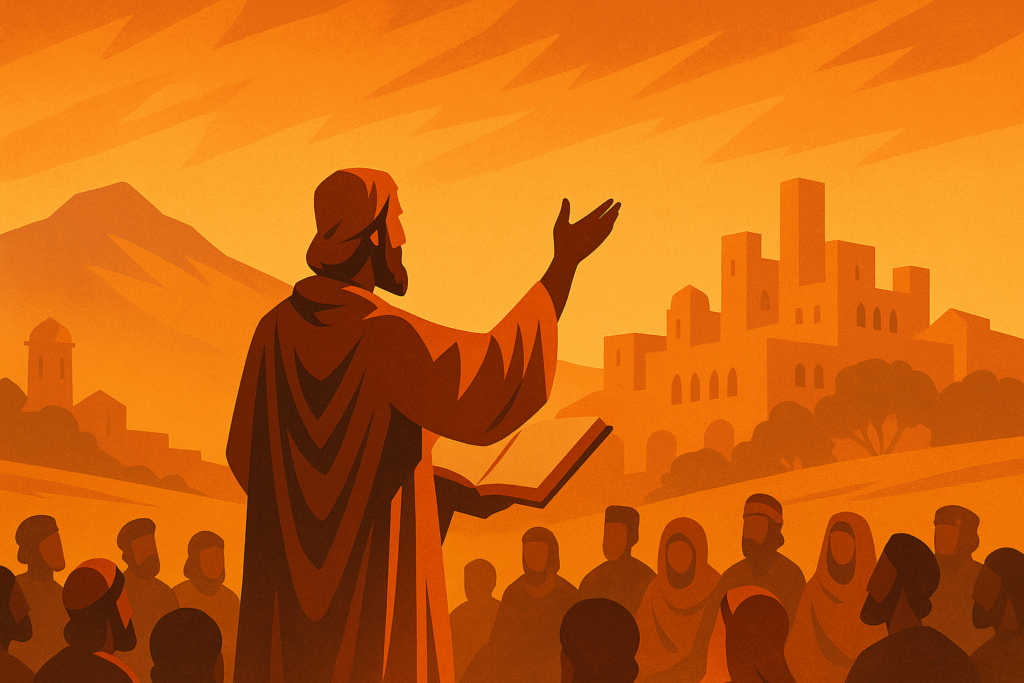In a noisy world of opinions, marketing, and religious confusion, many Christians ask, how do I share the gospel in a way that feels genuine, biblical, and effective? Rather than relying on scripts or pressure tactics, we can turn to the book of Acts as our blueprint. This early account of the church is packed with Spirit-led, Christ-centered gospel presentations that changed the world. And they still can.
Let’s walk through how the apostles proclaimed the good news—and how their approach can guide us today.
Start Where They Are (Acts 2, 13, 17)
One of the most striking features of the gospel messages in Acts is their adaptability. The apostles didn’t have a one-size-fits-all script—they started where their audience was. In Acts 2, Peter speaks to devout Jews during Pentecost. He quotes the prophet Joel and recounts Israel’s history to frame Jesus as the promised Messiah (Acts 2:14–36). In contrast, when Paul preaches to Gentile philosophers at the Areopagus in Athens (Acts 17:22–31), he doesn’t start with Scripture. He begins with their altar to an “unknown god” and quotes Greek poets to build common ground.
Today’s Application:
If you’re speaking with someone steeped in religion or familiar with the Bible, like Peter’s audience, start with their sacred texts or values. But if you’re talking with secular or skeptical people, begin with universal human experiences—beauty, longing, injustice, or death. Paul didn’t shy away from secular culture; he used it as a bridge to Jesus.
This approach reminds us that the gospel meets people where they are—not where we wish they were.
For a visual overview of the early church’s boldness, check out BibleProject’s overview of the book of Acts.
Tell the Big Story (Acts 7, 13)
The gospel in Acts is never just a quick pitch about Jesus dying for sins. It’s placed within the sweeping story of God’s faithfulness. In Acts 7, Stephen walks through Israel’s history—from Abraham to Moses to David—showing how God has consistently worked to bless and rescue His people. Similarly, Paul in Acts 13 recounts the story of Israel to show that Jesus is the fulfillment of God’s promises.
Scriptural Examples:
- Acts 7:2–53 – Stephen’s full recounting of Israel’s story
- Acts 13:16–41 – Paul’s proclamation in Pisidian Antioch
Today’s Application:
Don’t present Jesus as a stand-alone figure. Show how He fits into the grand narrative of creation, rebellion, covenant, and redemption. Help people see that the gospel isn’t a new religion—it’s the continuation and fulfillment of the human story.
Before presenting Jesus, the apostles retell Israel’s story—a story deeply rooted in what “righteousness” really means in the Bible.
Center Everything on Jesus (Acts 2, 3, 10, 13)
Every sermon in Acts zeroes in on Jesus. Peter declares that Jesus performed miracles, was crucified unjustly, rose from the dead, and is now exalted as Lord and Messiah (Acts 2:22–36). Peter also tells Cornelius, a Roman centurion, that Jesus “went about doing good and healing all who were under the power of the devil” (Acts 10:38). Paul, too, proclaims Jesus’ resurrection as the validation that He is the promised Savior (Acts 13:30–39).
Key Scriptures:
- Acts 2:22–36 – Peter’s Pentecost sermon
- Acts 10:36–43 – Peter’s message to Cornelius
- Acts 13:30–39 – Paul’s resurrection proclamation
Today’s Application:
When you share the gospel, make Jesus the focus. Not just His teachings, but His life, death, resurrection, and kingship. Proclaim that Jesus is alive and that His resurrection changes everything. The early church didn’t promote a philosophy or self-help plan—they declared a living person.
Call for a Response (Acts 2:38, 3:19, 17:30, 26:20)
The gospel isn’t just informative—it’s invitational. After Peter’s sermon at Pentecost, the people are “cut to the heart” and ask what they should do. Peter responds: “Repent and be baptized… and you will receive the gift of the Holy Spirit” (Acts 2:38). Paul tells the Athenians that God “commands all people everywhere to repent” because Jesus will one day judge the world in righteousness (Acts 17:30–31).
Scriptural Highlights:
- Acts 2:37–38 – Repent and be baptized
- Acts 3:19 – Repent and turn to God for refreshment
- Acts 17:30–31 – God calls all to repent in light of judgment
Today’s Application:
When sharing the gospel, don’t just inspire—invite. Be clear and kind about the response the gospel calls for: turn from false gods and self-reliance, trust in Jesus, be baptized, and receive the Spirit. The gospel calls us not just to believe something—but to become someone new.
Emphasize Resurrection and Restoration (Acts 2:24, 3:21, 13:32, 17:31)
The resurrection is the cornerstone of every sermon in Acts. Peter declares, “God raised him from the dead, freeing him from the agony of death” (Acts 2:24). Paul proclaims, “God has given proof of this to everyone by raising him from the dead” (Acts 17:31). The resurrection isn’t a spiritual metaphor—it’s a bold historical claim, the launch of new creation.
Key Texts:
- Acts 2:24 – God raised Jesus from death
- Acts 3:21 – Jesus will restore all things
- Acts 13:32–37 – The promise fulfilled in resurrection
Today’s Application:
Share the gospel as a message of hope, not just of forgiveness. The resurrection means Jesus is not only alive but that restoration has already begun. This hope is not escapist—it’s transformational. It means justice, beauty, and healing are coming because Jesus is Lord.
Speak Boldly, Humbly, and Contextually (Acts 4, 17, 26)

Throughout Acts, the apostles speak with Spirit-empowered boldness (Acts 4:31). But they also contextualize their message. Paul quotes Greek poets in Athens (Acts 17:28). Peter confronts guilt but offers mercy (Acts 2:36–38). Paul appeals to King Agrippa respectfully while sharing his testimony (Acts 26:1–29).
Today’s Application:
Speak with courage and compassion. Avoid arrogance or manipulation. Let your tone reflect the grace of the message you carry. Use your audience’s language and cultural references, just as the apostles did.
Let the Spirit Do the Work (Acts 2:37, 10:44, 13:48)
The most powerful moments in Acts happen when the Spirit moves while the apostles are speaking. At Pentecost, the crowd is cut to the heart. In Acts 10, the Holy Spirit falls on Cornelius and his household before Peter finishes. Paul speaks in Acts 13, and we’re told “all who were appointed for eternal life believed” (Acts 13:48).
Today’s Application:
You don’t have to manipulate or manufacture results. Trust the Holy Spirit to convict, persuade, and transform. Your job is to plant and water; God brings the growth (1 Cor. 3:6–7).
Final Thoughts: Sharing the Gospel Like Acts
The book of Acts gives us more than a few sermons—it gives us a model. One that’s bold, humble, Spirit-led, and always centered on Jesus. If you’re wondering how do I share the gospel in today’s world, the answer isn’t a script. It’s a story. It’s a Savior. And it’s a Spirit who still moves.
Whether you’re speaking from a stage, sharing over coffee, or posting online—this ancient message still works. Because Jesus is still alive.

